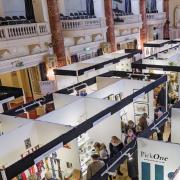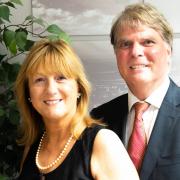Peter Morris has taken Howard Tenens from making car crates for exporting vehicles into one of the UK’s most successful, privately-owned logistics companies
Peter Morris, chairman of Howard Tenens, is just back from a trip to Monaco looking tanned and relaxed. And why not. He’s had 50 years of hard graft building up his business into one of the UK’s most successful privately-owned logistics companies.
From its headquarters at Stroud, Howard Tenens runs a huge property portfolio of over 3.5 million sq ft of commercial space, largely across the South of England, and works with clients such as Costa Express UK and Honda.
Peter’s back just in time to open the largest new-build warehouse the company has ever built. Located at Sharpness Docks near Gloucester it extends to 169,000 sq ft of modern warehouse space and is one of the largest speculatively developed warehouses in the South West. The site is located between Junctions 13 and 14 of the M5 motorway.
I hardly like to mention his age, because he seems to have more energy and determination than the most upwardly mobile young corporate executives I’ve met, but he’s 72 and has no plans to retire. “My ambition for the business is to keep growing successfully,” he says. “We have to be flexible, best in class and go with the market. We’ve grown significantly but I don’t mind if we are smaller as long as we are the best at what we do and give the customers what they want, providing we are profitable.”
Peter’s father set up the company in the mid 1950s to make car crates for exporting motor vehicles. Peter left Monmouth school with one A-level and was told firmly at a parents’ evening that he wasn’t university material. “I grew up in the beautiful Wye Valley. It was before the Severn Bridge was built and father lived there because the original business operated across Newport, Cardiff and Swindon.”
Morris junior wanted to see the world. After school he spent 18 months in Canada working for MacMillan Bloedel, a large forestry business, first logging then working his way through the departments. “It was long hours but great pay. I was able to buy a car after a month, an old Ford Thunderbird for $500.”
He moved to Argentina and then to the USA, working with Ford, Chrysler and Fiat before relocating to France and running the Howard Tenens logistics car crate contract with Renault. He then went to work with Pressed Steel Fisher in Swindon.
He was clearly having too good a time, because after a few years the decree came from Morris senior that it was time to settle down, and at the tender age of 21 he got married. The relationship ultimately produced six children who now have nine children of their own.
At this stage Howard Tenens was crating up to 8,000 cars a week to ship all over the world. Peter continued to learn the business, including taking a graduate trainee course at Pressed Steel in Oxford to learn more about the motor trade, followed by a spell in management consultancy at Binder Hamblin, London. “I learned the tricks of the trade in dealing with accountants and resolving management problems. Management back then was pretty grim,” he says.
Peter’s father retired in 1972 and the company continued to grow. By 1976 it was employing around 2,000 workers and Peter was travelling all over the world. Howard Tenens was one of the largest case and packing manufacturers in the UK, making them in Boston, Lincolnshire (where the company still has premises).
At that time, the UK motor trade was lacking in investment, but Howard Tenens was cash rich and seized the opportunity to broaden its business, investing in a paint plant, factories and running most of Unipart’s distribution, among a number of diversifications.
By 1979 Peter was managing director of the business his father had started. Some of the investments the company had made were successful, others weren’t, so Peter started to rationalise, selling off non-profitmaking entities and in 1983 he organised one of the UK’s first management buy-outs.
The MBO included the transport and warehousing operations side of the business, but very little of its large property portfolio. That didn’t hold the business back and Peter began extending outside the motor trade into general distribution. This is the strategy that has made Howard Tenens the £70 million turnover business it is today.
Having relinquished the large property portfolio when he undertook the management buy-out, Peter has spent the past 30 years building up a new one. Part of this is in Ede Homes, a housing and development company.
“We build about 50 houses and apartments a year, many in Oxford but we’ve also built in Tetbury and around the Stroud area,” he explains.
This is a company that doesn’t stand still. Howard Tenens has developed from making car crates to a successful warehouse and storage facility. It is unusual in that it owns the majority of its warehouses.
Peter continues to look at the future. “We are going to have to adjust our warehousing to fulfil the growth in online and ecommerce retailing,” he says.
Howard Tenens has adapted to changing markets and Peter believes you make your own luck by working hard. “Building the business was hard. Now it’s about making sure we’ve got the right people.
“We have a new chairman of logistics operations, Keith Charlton, and he’s fantastic for the company. But we are a family concern and we want to keep it that way. Two of my sons work in the business and our customers appreciate this aspect. One of my grand-daughters has also just started to work for us.
“Howard Tenens will continue to succeed if we diversify and are swift on our feet,” he adds. One example is in solar energy installations. The company works with a number of companies that install solar PV panels.
“We store the solar PVs and deliver them to farms. One of the biggest issues is that our trucks must cross farm tracks and fields, none of which have been built for heavy lorries. We’ve had to work with our customers in overcoming access issues. It’s all about differentiating ourselves, adding value to our services.”
Peter admits that this year the company will invest more in its IT systems than in vehicles (though he winces a bit as he tells me. After all, you can see what you’ve got for your money when there’s a dozen articulated lorries parked outside the warehouses, much less so with software and cable trunking).
Peter Morris’s children will have to wait a few years longer to step into his big shoes. Unless, of course, they can persuade him to visit Monaco a bit more often, to indulge his passion for watching vintage and historic car racing.



























